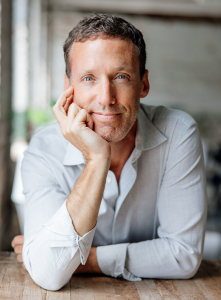The United States is a much more hostile place for transgender people since 2016 when conservatives promoted bathroom bans to stoke fear against one of the most vulnerable populations in society, Baptist News Global Executive Director Mark Wingfield said.
“It was easier then — but not easy — to be a transgender person than it is today because they were trying to stop you from using restrooms, they were not trying to kill you. And what’s happening today is an effort literally to kill trans folks by denying them medical care,” Wingfield said during an Aug. 29 webinar hosted by Making Things Right, an organization dedicated to helping Christians rethink responses to LGBTQ people.
Interviewed by MTR’s Brian Nietzel, Wingfield shared how his life and career as a Baptist minister and journalist came to include serving as a high-profile Christian friend and voice for the transgender community.

Mark Wingfield
Nietzel described Wingfield’s advocacy as crucial given that 86% of LGBTQ people were raised in the church and more than half left after turning 18 due to negative experiences in their congregations, “and that’s what I think our conversation as Christians should be about.”
Wingfield agreed, but with the caveat that his activism derives from empathy for transgender people, not from his or a family member’s experience. “I need to say up front that I’m not here to tell my story,” he said. “I’m here to represent the story of my friends and people I’ve met along the way, people who have opened their lives to me. And I want to be clear up front: I have tremendous privilege in telling this story.”
Wingfield said the journey began shortly after the 2015 U.S. Supreme Court ruling in Obergfell v. Hodges that extended the right of marriage to same-sex couples nationwide. “Suddenly, churches are having to decide, are we going to do same-sex weddings?”
Among those was Wilshire Baptist Church in Dallas, a congregation already committed to racial and gender justice and where Wingfield served at the time as associate pastor.
As a staff resource to the 18-member Inclusion and Diversity Study Group assembled to study the issue, Wingfield said he listened in amazement in May 2016 to a scientific and medical presentation on the genetics of transgender identity, including how chromosomes do not define gender identity and how gender identity is separate from sexual orientation.
“My brain was exploding because I’m thinking I know a lot of stuff and I’ve never heard any of this before. Why did I not know this?”
Assuming many others were also in the dark, Wingfield penned “Seven Things I’m Learning about Transgender Persons,” a column for BNG, which he then served as a board member and regular columnist.
“I discovered there was so much I didn’t know, and I would listen to their stories and I would weep with them about their pain.”
“It had been published at 5 a.m. Eastern time and when I awoke at 6:30 a.m. Central time, my phone was blowing up, my email was blowing up, my Facebook was blowing up, everything was blowing up,” he said. “My wife and I described watching Facebook as being like watching your electric meter spin on a hot Texas day. It was just going crazy, and it reached 1 million views in short order.”
The attention generated by that column and a follow-up piece at BNG led to a TEDx Talk and radio and newspaper interviews, thrusting Wingfield into what he described as the unlikely role of spokesman for transgender people and their families.
In the article, he said he didn’t know anyone who was transgender but he would like to. And that opened the floodgate of calls from transgender people who offered to become his friend, he said. “Here are all these people, by the dozen, reaching out to me. And they would invite me to come sit with them for coffee or for breakfast or for lunch or dinner. And I would go sit and just listen. I discovered there was so much I didn’t know, and I would listen to their stories and I would weep with them about their pain.”
His status as a minister also helped “because every one of them had been raised in the church and every one of them had been rejected by the church because of who they were,” he said. “The burden of that was just absolutely overwhelming.”
The viral columns and all the attention they generated occurred around the time of proliferating bathroom bills seeking to require transgender people to use restrooms that correspond with their gender at birth. “Thankfully those didn’t go very far, but they created a big profile and so my column came out right in the middle of that and it gave us a platform to speak,” he recalled.

Brian Nietzel
Nietzel praised Wingfield for modeling the compassion and understanding Christians should be showing members of the LGBTQ community and for calling out efforts to vilify transgender people.
“You said being homophobic is no longer acceptable, but being transphobic is acceptable, and that there is an evangelical and political war on trans people — and they’re winning. They are creating a boogeyman and (spreading) a whole lot of myths and misinformation and disinformation.”
The primary source of those dehumanizing efforts is Focus on the Family and its network of right-wing evangelical advocacy groups that are promoting legislation to deny gender-affirming medical care to transgender people, Wingfield explained.
“I personally know people who have fled the state of Texas with their children and their teens to other states because they feared for their teenager’s life and not being able to get the medical care they need. And we’re not talking about surgery here.”
The claim that children are being groomed to be transgender in schools or liberal churches is equally preposterous, he said.
One method anti-trans groups use to promote such laws is to claim specialized medical treatment involves cutting off the breasts or penises of children, he said. “This is a scare tactic that’s being used. When we talk about gender-affirming care for minors, it’s generally hormone blockers. It’s a medication issue and it’s allowing kids to identify with the gender they know in their hearts they are.”
But the fearmongering does not end there, Wingfield said. In parallel with efforts to ban abortion outright, anti-trans activists are “screaming” accusations of child mutilations in gender-affirming medicine, that public school teachers are turning children transgender, that transgender identity violates Scripture, that trans identity is a mental illness and that being trans is a choice made to get attention.
“If you ever talk to a transgender person, nobody in their right mind would choose to do this just to get attention,” he asserted. “It is way too hard, it is way too painful. You give up way too much. And every transgender person I’ve spoken to — I’m talking about hundreds of people here — has told me they knew when they were 3, 4 or 5 years old they were not in the right body.”
The claim that children are being groomed to be transgender in schools or liberal churches is equally preposterous, he said. “Dear God in heaven, why would anyone do that? I’ve never seen that. It doesn’t even make sense. But this is the way some people’s minds work because they’re so suspicious about everything.”
Claims that transgender identity violates the Bible don’t hold water either because the issue is never mentioned in its pages and because the creation account in Genesis leaves room for nonbinary gender, Wingfield said. As with dawn and dusk, “there are things God created that have variations and shades along the way, and gender is one of those. And we have actually known this for millennia.”
Science, meanwhile, has debunked the claim that transgender identity results from mental illness, he said. “It is a medical condition; it is not a delusion. It is actually being forced to live and identify in a body that you know is not your own. And you would have mental problems, too, if you were forced to do that.”
“It is easy to persecute them and get away with it because they do not have the capacity to bite back.”
A current challenge for transgender people and their families is a growing sense of compassion fatigue among potential allies, Wingfield added. “There is fatigue on all the social issues, and trans identity has taken a back seat to overall LGBTQ inclusion, but more importantly, it’s taken a back seat to the abortion debate and several of the other really important debates about democracy itself.”
Religious arguments about what is a medical issue brings a level of meanness and intensity that is terrifying to a community that represents less than 1% of the U.S. population, he said. “It is easy to persecute them and get away with it because they do not have the capacity to bite back.”
And suicide among transgender persons whose families cannot afford to go out of state for treatment is a deadly consequence of successful anti-trans campaigns, Wingfield said. “The suicide rate among untreated children and adults with gender dysphoria is in the high 40% range. It is one of the most severe suicide rates in America.”
Christians who want to be part of the solution can start by meeting and getting to know trans people, he advised. “Listen to their stories. My life was changed by listening.”
“And show some kindness to reduce the vitriol that’s happening on this because most of the people who are talking about transgender identity don’t know what the heck they’re talking about. They have been listening to Fox News, they have been reading Focus on the Family. They don’t know anything, but they think they know everything.”
Related articles:
Seven things I’m learning about transgender persons | Opinion by Mark Wingfield
Painful lessons from a pastor’s viral transgender post | Opinion by Mark Wingfield
Why being transgender is not a sin | Opinion by Mark Wingfield
Baptist minister unlikely advocate for transgender community


